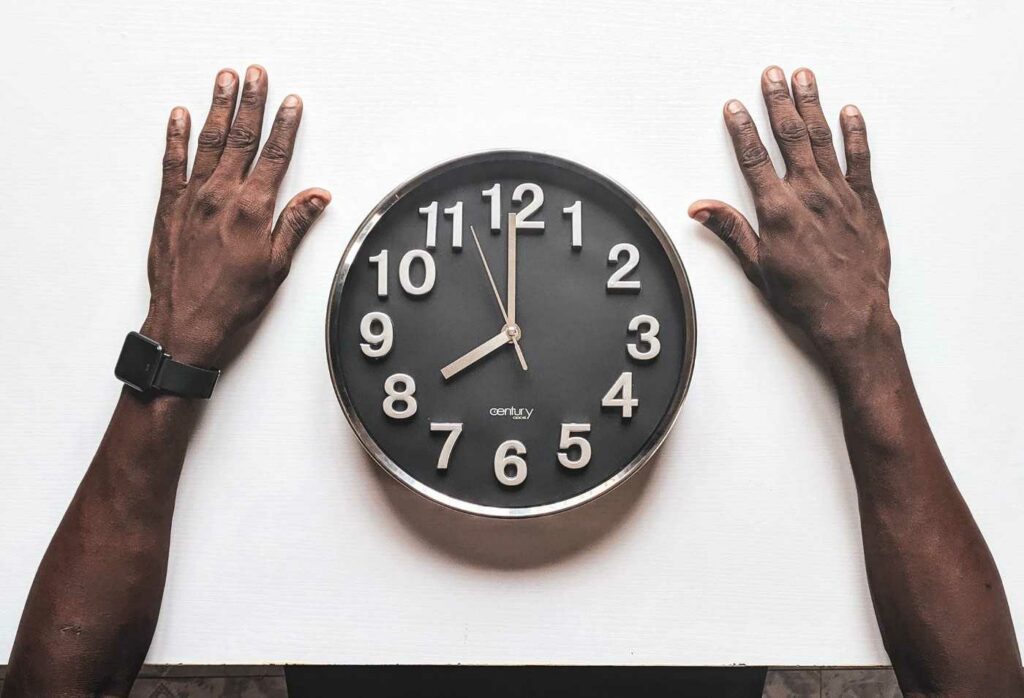How many times have you felt like you’re running out of time? How many times have you wished you had more hours in the day? If you’re like most people, the answer is a lot. We live in a world where it seems like we’re always racing against the clock. And this can lead to a lot of anxiety and stress. In this blog post, we will discuss time anxiety and how to deal with it to reduce your stress levels!
Contents
What Is Time Anxiety?
Time anxiety is described as a feeling of unease or worry about the future. This may be caused by a number of factors, including work deadlines, upcoming exams, or personal deadlines. Time anxiety can also be caused by a fear of not having enough time to do things that are important to you.
Moreover, the condition is also associated with a sense of time pressure and urgency. This means that people who suffer from time anxiety often feel like they are running out of time. According to studies, time anxiety is a common problem that affects people of all ages.
Therefore, it is important to learn how to deal with the feeling of running out of time. Because it can be a debilitating condition that can lead to stress, anxiety, and even depression.
Truth About Time Anxiety
This is often a feeling we experience when we’re younger. We think there’s not enough time to do everything we want to do. And, as we age, this feeling only gets worse. But, there is a difference between what it feels like and what time anxiety is actually.
So, here let’s unveil the truth about time anxiety
What It Looks Like
Time anxiety can show up in different ways. For some, it may be a sense of urgency to do everything now. Or, it may be feeling like you’re behind and need to catch up.
It is also believed that time anxiety is relatively a worry about being late. It is natural to feel some sense of anxiety when we are running late for something. The feeling of time pressure is normal in this scenario. And due to this, a sudden rush to leave can also be a sign of time anxiety.
The feeling of uneasiness and restlessness are also some of the symptoms that you may experience. When we worry about time, it can be hard to focus on anything else. This is because our minds are preoccupied with thoughts of what needs to be done. So, this is what it looks like but in reality, it can be something else.
What It Actually About
The reality is that time anxiety is not really about time at all. It’s about our relationship with ourselves and how we’re perceiving the present moment. Time anxiety is the result of feeling like we’re not doing what we should be doing or that we’re not living up to our potential.
It is often the escapism of wanting to be somewhere else or someone else that creates this sense of anxiety. We compare our current reality with an idealized version of what we think our lives should be and feel disappointed. This can lead to feelings of inadequacy, loneliness, and depression.
Moreover, a fear of living without meaning or purpose can also contribute to time anxiety. If we don’t have a sense of why we’re doing something, it can feel like a waste of time. This is why it’s so important to connect our actions to our values and what we believe in.
When we’re feeling time anxious, it’s helpful to remember that everyone experiences this at some point in their lives. It’s a natural human emotion that is often caused by our own thoughts and perceptions. So, the reality and perception of time are what we need to work on.
Consequences Of Time Anxiety
 There are many consequences that can come from having time anxiety. Some of the negative impacts include:
There are many consequences that can come from having time anxiety. Some of the negative impacts include:
Increased stress levels
One of the most common consequences of time anxiety is increased stress levels. When you feel like you’re constantly running out of time, it can lead to chronic stress. This can then lead to a number of other health problems, such as:
- Sleep problems
- Anxiety and depression
- High blood pressure
- Heart disease
- Stroke
- Diabetes
- Memory and concentration problems
These problems can be more severe if you already have a mental health condition. If you’re struggling to cope with time anxiety, it’s important to seek help from a mental health professional.
Anxiety and fear about the future
During the time anxiety, it is very common to experience anxiety and fear about the future. This can be overwhelming and cause a great deal of distress. It is important to remember that this feeling is only temporary and will eventually pass. However, fear about the future can be paralyzing and make it difficult to live in the present.
Procrastination
This is often a symptom of time anxiety. When we are feeling anxious about the future, we may procrastinate and put off tasks that need to be done. In fact, this consequence of time anxiety can make the problem worse. By procrastinating, we are only increasing our anxiety and making it more difficult to get things done.
Tension in relationships
Relationships are the foremost thing that gets disturbed with anxiety disorders. When we are feeling anxious about the future, it can be difficult to be present in our relationships. We may withdraw from our loved ones or become overly clingy. This can lead to tension and conflict in our relationships. In fact, time anxiety can be a major contributor to relationship problems.
Decreased productivity
If you are feeling worried and anxious about the future, it is obvious to face decreased productivity. The mind is always racing with thoughts and it becomes difficult to focus on the task at hand. This can have a major impact on our work or school performance. Also, it is believed that time anxiety can lead to burnout. This is is because we are constantly trying to do more and more and we never feel like we are doing enough.
All of these consequences can have a serious impact on your life and well-being. If you’re struggling with time anxiety, it is important to seek help from a mental health professional. They can help you manage your anxiety and get back on track.
Tips To Manage Time Anxiety
 It is important to understand that time anxiety is a real feeling and it can be very debilitating. Here are some tips to help you manage your time anxiety:
It is important to understand that time anxiety is a real feeling and it can be very debilitating. Here are some tips to help you manage your time anxiety:
Identify your triggers
Triggers are the things that set off your time anxiety. Once you know what your triggers are, you can start to manage them. For example, if you have a lot of work to do, try to break it down into smaller tasks so you don’t feel overwhelmed. Moreover, this is a good time to learn how to say “no” without feeling guilty.
Schedule breaks
It is important to schedule breaks into your day so you can have time to relax and de-stress. During your break, try to do something that you enjoy or that makes you feel good. This can be anything from reading a book to taking a walk, to listening to music. In fact, this is a good time to incorporate some self-care into your day.
Talk to someone
If you’re feeling really anxious about time, talking to someone can help. This could be a friend, family member, therapist, or any other support system. Talking about your anxiety can help you to understand it better and may also give you some relief. It is considered one of the most important tips to manage time anxiety. In fact, sharing your feelings and experiences with others can be very therapeutic.
Practice mindfulness
Mindfulness is more about being in the present moment and less about worrying about the future. It can be helpful to practice mindfulness when you’re feeling anxious about time. There are many ways to be mindful, but one way is to focus on your breath and count each inhale and exhale. This can help you to ground yourself in the present moment and may also help to reduce your anxiety.
Avoid comparisons
It is really essential to avoid comparisons because it can make your time anxiety worse. Everyone experiences time differently and moves at a different pace. Therefore, comparing yourself to others is not productive or helpful. It is important to focus on your own journey and what works for you. Also, keep in mind that nobody’s life is perfect, so try not to compare yourself to what you see on social media. Just remember that you are on your own unique path.
Find ways to connect actions
This is a good tip to manage time anxiety in general, but it can be especially helpful if you find yourself anxious about a specific task. For example, if you need to clean your house, try listening to music or lighting a candle while you do it. This can help to connect the action with something that is relaxing or pleasurable. Additionally, it can help to break up the monotony of the task and make it feel less like a chore.
Practice healthy coping mechanisms
Healthy coping mechanisms are important for managing any type of anxiety. Some healthy coping mechanisms include:
- exercise,
- journaling, and
- deep breathing.
Additionally, it is important to find a balance in your life between work and play. Make sure to schedule time for activities that you enjoy and make time for relaxation. By incorporating healthy coping mechanisms into your life, you can help to reduce your time anxiety.
Seek professional help
Professional help is always an option if you feel like you can’t cope with your anxiety on your own. A therapist can help you understand and manage your anxiety in a more holistic way. If you’re interested in seeking professional help, talk to your doctor or do some research to find a therapist in your area. There are various therapies and even medication options that can help lessen the symptoms of anxiety.
Take some time for yourself
In addition to professional help, it’s important to take some time for yourself to relax and de-stress. Make sure to schedule some “me time” every day or week to do things that you enjoy. This can be anything from reading, going for a walk, or taking a yoga class. Taking some time for yourself will help you recharge and hopefully lessen the feeling of anxiety.
Stay calm and positive
 This is easier said than done, but it’s important to try to stay calm and positive when you’re feeling anxious. Anxiety can be a self-fulfilling prophecy, so if you allow yourself to get worked up, the anxiety will only get worse. Try to take some deep breaths and remind yourself that everything is going to be okay. It might not seem like it at the moment, but anxiety is usually temporary and things will eventually get better.
This is easier said than done, but it’s important to try to stay calm and positive when you’re feeling anxious. Anxiety can be a self-fulfilling prophecy, so if you allow yourself to get worked up, the anxiety will only get worse. Try to take some deep breaths and remind yourself that everything is going to be okay. It might not seem like it at the moment, but anxiety is usually temporary and things will eventually get better.
So, overall these are the prominent tips that can help you deal with anxiety. Make sure to give them a try next time you’re feeling overwhelmed and see how they work for you! Also, do not hesitate to seek professional help if you feel like you need it. Anxiety is a real and serious issue, but with the right help, it can be managed.
Conclusion
To conclude, time anxiety is a very real thing that can impact our lives in a negative way if we let it. However, by learning to recognize the signs of time anxiety and taking steps to manage it, we can help minimize its impact and better enjoy our lives. In fact, it is believed that by managing our time anxiety, we may even increase our lifespan!
For more information, please contact MantraCare. Anxiety is a common mental health condition characterized by persistent feelings of worry, fear, and apprehension. If you have any queries regarding Online Anxiety Counseling experienced therapists at MantraCare can help: Book a trial Anxiety therapy session


